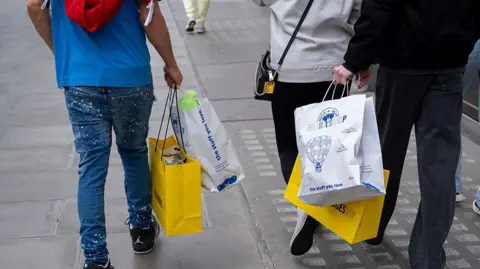What will reset deal mean for UK economic growth?
54 minutes agoDharshini DavidDeputy economics editor, BBC News

 Getty Images
Getty ImagesThere was much fanfare – and then lunch on the Thames – to mark the “reset” of the relationship between the UK and the EU with claims of a “huge” potential boost to growth.
The deal does represent a significant breakthrough in deepening ties in the UK’s most important trading relationship and paves the way for more gains while still allowing scope for pursuing other trade deals.
But ultimately what has been agreed so far only dismantles a fraction of the trade barriers erected post-Brexit.
Those producing and selling foodstuffs between Britain and the EU, in particular, are celebrating a reduction in red tape and checks.
The agreement on plant and animal health, or sanitary and phytosanitary standards (SPS), goes further than envisaged a few months ago. By agreeing to follow EU rules, the government has faced accusations of selling out on sovereignty. But it will smooth the path for over 1,500 products crossing borders.
The new UK-EU deal at a glance
For more than four years, those selling agricultural products from Britain to the EU have had to comply with extra certification and checks, intended to prevent the spread of disease and ensure food safety.
Amid frequent complaints of forms stretching to dozens of pages and fish and other perishables rotting in transit, the Food & Drink Federation claims that exports of such items to the EU have dropped by a third since 2019.
Small companies were particularly likely to conclude it wasn’t worth the effort; the variety of products being exported was reduced as costs increased. Formalities on items coming into the UK, too, have been ramped up, albeit more gradually
By doing away with some of the paperwork and inspections, the government claims this agreement – and the one centred on energy – will be worth £8.9bn to the UK by 2040.
Those predictions are always uncertain but that’s roughly equivalent to 0.3% of GDP – helpful but not quite the “huge” boost to growth it claims. And that would recoup only a small fraction of the 4% of GDP the government’s own independent forecasters reckon has been foregone as a result of Brexit.
What about prices?
Some studies suggest that greater red tape has contributed to higher prices for foodstuffs imported from the EU in recent years.
And while retailers are among those welcoming this deal, it’s not guaranteed that any savings in costs will be passed on, although the deal could limit the degree of future increases in the price of – that depends on suppliers passing on savings.
The key concession made by the UK was an extension to the agreement on fisheries by 12 years. That sector represents just 0.04% of GDP, but clearly this will be a big disappointment to some fishing communities, concerned by an encroachment of rights. However, exports of fish to the EU have fallen by 29% over the course of just a few years – the SPS agreement is likely to help reverse that loss.
What’s been agreed in detail so far may not provide the “huge” boost to growth the government wants, but there is more that should be ahead.
The youth mobility scheme could deliver significant gains, depending on the details that are hammered out, as could the mutual recognition of professional qualifications.
But even those are unlikely to repair even the majority of the damage to growth some economists reckon Brexit has caused.
The independent Office for Budget Responsibility, the official forecasters, had reckoned that as a result of Brexit GDP will be the equivalent of 4% lower than it could have been. That’s the equivalent of costing the economy £100bn per year.
Fully compensating for that, analysts reckon, would involve the UK rejoining the single market and customs union and allowing freedom of movement – all of which the government reiterated today are “red lines” it’s not prepared to cross.
But there is still a very significant triumph the government can claim. In a short period of time, it has tied up trade agreements with India and the US – and struck this improved deal with the EU.
The latter, in particular, may have been given added impetus by President Trump’s trade hostility.
Knowing it perhaps could rely less on that traditional ally across the Atlantic may not have driven the EU and UK into each others arms, but it likely added a new focus on working to break down barriers previously thought insurmountable.
Moreover, the UK has achieved something many commentators thought not possible in the early years of Brexit, securing a deal (albeit limited) with the US without lowering food standards and so managing to align with EU rules.
This deal may not be a huge growth gamechanger. But it paves the way for reaching more common ground with the EU while allowing the UK to strengthen ties with the US on services, in particular financial services, and technology – areas of growing importance for British firms doing business with America.
And that strategic focus on building on our economic strength is not to be sniffed at, particularly at a time of geopolitical uncertainty